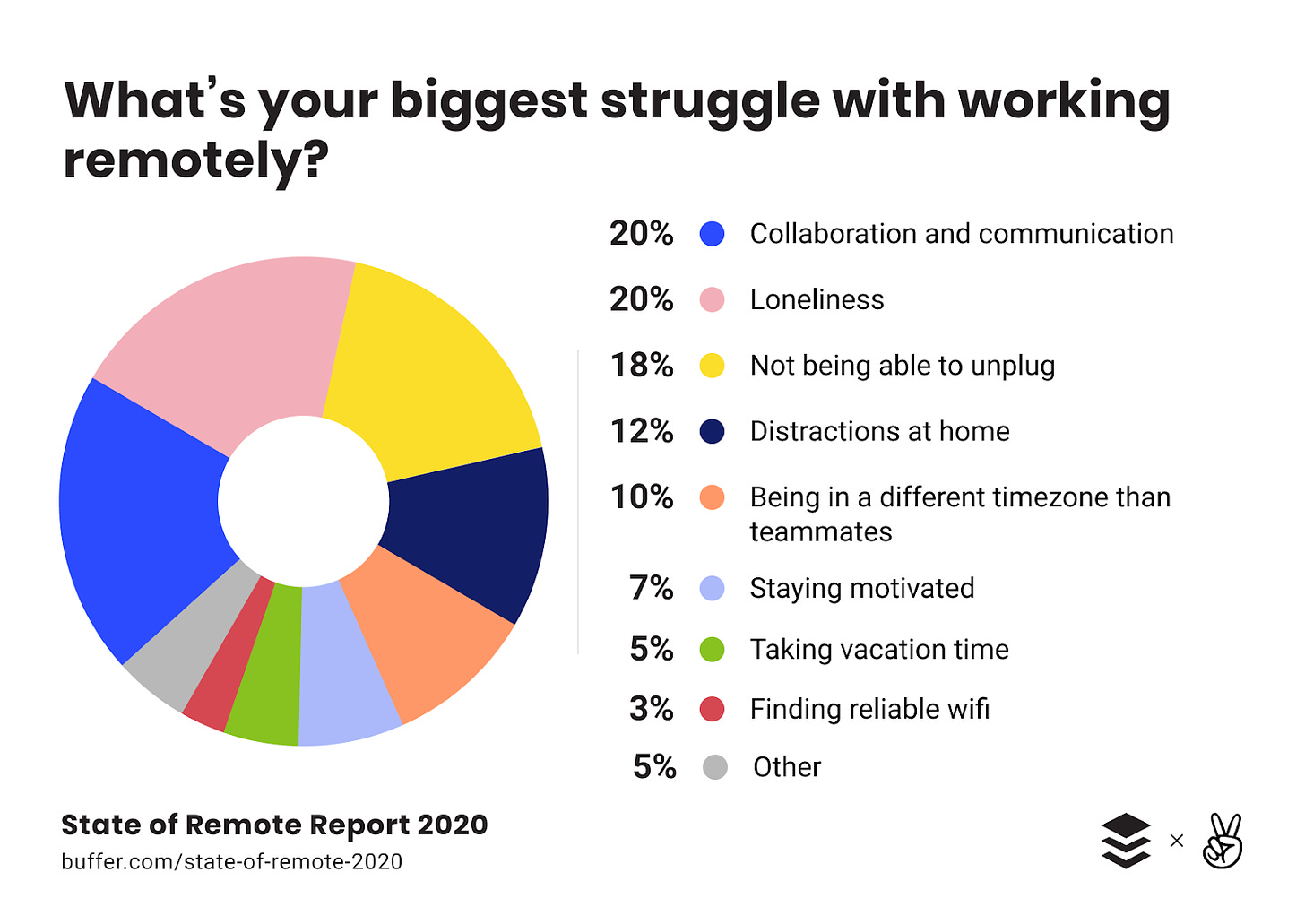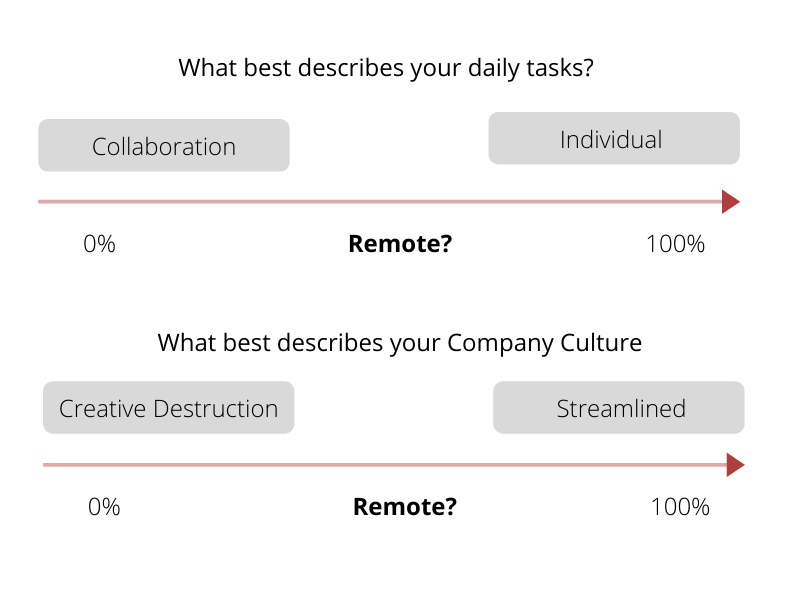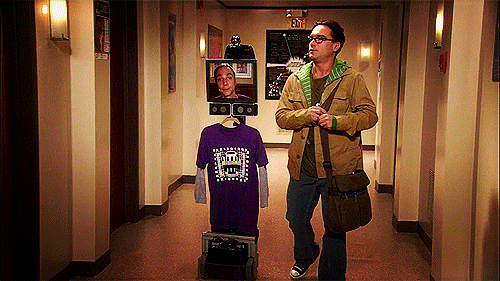Rytsas!
We hope you are safe and had a great weekend. We’re sorry we were AWOL last week - we spent some time working off of your feedback and fiddling with our format.
This week we’re covering Remote Work. To be specific the companies that make remote work possible.
But first, a quiz for you: Which of these headlines is false?
A virtual hearing by the US Supreme Court was interrupted by the distinct sound of a toilet flushing.
Pandemic policies at tech companies have created a rift between parents offered more benefits and resentful workers who don’t have children.
Investor Hunter Walk and the Verge’s Casey Newton’s virtual happy hour was interrupted by a Zoombombing.
In addition to going paperless by 2021 the Dubai government has decided to go virtual by 2025.
As companies spend time working remote they’re starting to ask whether they need to have large offices and pay premium rents. More companies each day are coming out and saying they will be remote first or entirely remote: Coinbase will be a remote first company, Twitter (+Square) say employees can be remote forever and Shopify will be ‘digital by default’. We might soon start seeing ‘physical office’ as a perk in jobs instead of the ‘remote possible’ today. From Buffer and AngelLists state of remote work 2020:

So, which is it? Sustainable long-term trend or short-term pain in the ###?
We are already on our way to what BCG calls ‘bionic organizations’ where humans and technology co-exist. CoVID simply accelerated that transition by creating urgency.
For example, if you are in Sales you use Unbounce to create landing pages, Leadfeeder to get qualified leads, Prospect.io to get emails and send personalized communication and calendly or x.ai to setup meetings. All of which tie into your CRM to create automated reports for your boss. So you only spend time speaking with potential customers and not in paperwork.
There are benefits (?) of companies going remote:
Employees get more time to do focussed work with out interruptions. This should reduce distractions since it takes 23 minutes to get back to a task.
If most people work remote then your visa status doesn’t matter - companies can hire people from around the world for high value roles and not just grunt work.
Rent will go down as people move out of the Bay Area or downtown London, Shanghai or Mumbai. Traffic and city congestion will go the same way.
On the flip side, there are also legitimate concerns:
JP Morgan has noticed a productivity decline in employees and is encouraging employees to get back to the office, and
Netflix CEO Reed Hastings says it’s been difficult to debate ideas remotely saying that employees will be back in the office “12 hours after a vaccine is approved”.
Employees have concerns around loneliness, distraction at home and not being able to unplug

How much of your role will be remote will depend on the nature of your job and your organizations culture

So, What’s Happening?
There’s an old saying: “The big winners in the gold rush were the ones who made the shovels”. As we get forced indoors and buckle down for the long run companies making remote working tools will get boosts, like Zoom who saw a 458% QoQ increase in customers.

But, it’s not all graphs going up and to the right - Slack’s stock dropped almost 20% after they reported earnings because even though usage increased, customers facing financial crunches didn’t sign up for as many licenses.
Which companies are likely to benefit from this shift?
Identity Management: Tools that help you identify who in the company you should be speaking with. Tools like Okta and Rimeto (acquired by slack recently) create an enterprise directory which links into your communication and collaboration tools.
Communication: Tools that enable teams to communicate with each other actively (email, Slack, Microsoft Teams) or passively (Kanban Boards, CRM, Standup bots or task management). There are two ways these tools sell to organizations: top-down (Microsoft Teams) i.e. sell to the boss who forces usage or bottom-up (Slack) i.e. sell to the users who force their boss to buy. Since more enterprises without sophisticated workforces are looking to move remote top-down sales are more likely to benefit.
Collaboration: Tools that help teams build products or solve customer problems together. This includes online brainstorming like virtual whiteboards (Miro, Mural), digital design management (inVision or Zeplin) and customer success/support or issue management (Zendesk, Gainsight or Intercom). There is also a growing trend of ‘omnichannel’ platforms like Airship. And there are tools where you can do all of this together like Basecamp.
Documentation: Tools that document what decisions were taken and why (Confluence) or help you sign documents digitally (Docusign).
A Remote Day
If you were wondering what life will be like if you are working remote. We spoke with a few people who’ve moved work online and here’s what they said their day looks like.

8:00 AM: Check your calendar to see what meetings you have lined up and check your email (Hey, superhuman and … yes Gmail and Outlook) and then login to Slack to give your update to your standup bot and see any notifications you missed.
8:30 AM: Check your Kanban board (Jira, Trello or Asana) or your CRM (Salesforce, Zendesk) and start on your action items. Sign agreements using Docusign.
1:00 PM: Zoom meeting with your team - you use collaborative tools (Miro, Mural) to facilitate the meeting and increase engagement.
3:00 PM: Chat with coworkers in another time zone who are just getting up (Slack, Microsoft Teams btw.. there’s an interesting fight going on there). Get teams onboarded remotely. Onboarding!!!!
5:00 PM: Emails. This hasn’t changed at all.
6:00 PM: Group workouts on Peloton
7:00 PM: Read Chrispy & Aditya’s Newsletter before calling it a day :p
Here are a few podcasts that talk about going remote and what that means for the future of work:
Jake Knapp and Jonathon Courtney: https://podcasts.apple.com/es/podcast/jake-and-jonathan/id1320916842?l=en&i=1000475634591
a16z (10:20 onwards): https://podcasts.apple.com/es/podcast/16-minutes-news-by-a16z/id1474431037?l=en&i=1000483961521
And for those of us who do go to the office here’s a nice representation of what those offices could look like:

Jobs Jobs Jobs
Amsterdam & US - https://miro.com/careers/
Global & Remote - https://boards.greenhouse.io/canonical?t=989ce6181us
Remote - https://time-doctor.breezy.hr/p/044f30c3da9a-product-manager-100-remote
Latest News from European Startups
Swedish buy now pay later company Klarna raised $650M in a round led by Silver Lake valuing it at ~$11B 🤑
European founders spilled on the ultra exclusive founder-only poker nights that have been going on since 2007
Lava Theraputics a Netherlands and US based biotech firm raised $85M in a Series C round for its cancer therapies.
Bayes a Berlin based e-sports company raised $8M in funding
Berlin based vertical farming company Infarm raised $170M in a Series C.
HappySignals a Helsinki based IT employee experience management platform raised $5.5M in Series A funding.
Social Buzz ->
Looking to setup the perfect work station? Here’s some inspiration: https://www.reddit.com/r/battlestations/
Jason Fried is the OG remote work influencer. He’s written books (multiple) on how remote work is a different way of working.
Kieran Flanagan is the VP of Marketing at Hubspot and his feed is a goldmine for remote work news, tips & tricks.
Checkout what’s going on inside Google re:work as they talk about their experiments with creating the best work culture
Cheryl Cran is a Future of Work super influencer
Answer to the Quiz
True. And there are 9 suspects
True. It’s an interesting debate. One we don’t feel quite qualified to weigh in on.
True. They’re a (very disturbing) thing. Here’s an article that helps you make sure that doesn’t happen to you: https://techcrunch.com/2020/03/17/zoombombing/
Not True. As far as we know. But I think we speak for everyone that we’d be really happy if this actually happened.
Take Care.
Stay Safe.
Wash your hands.




